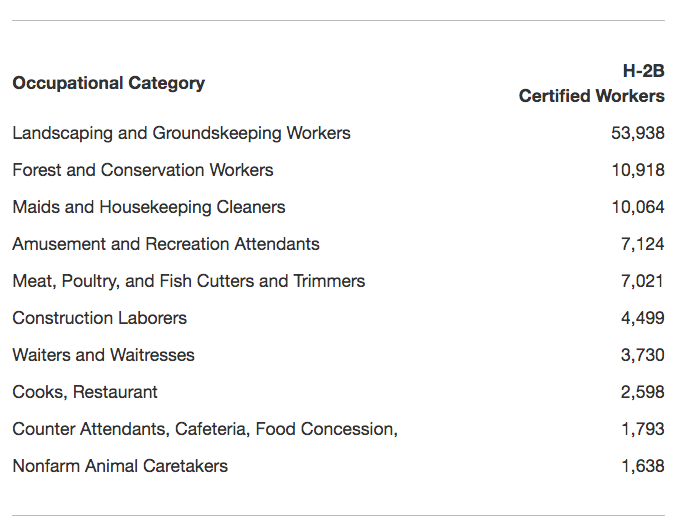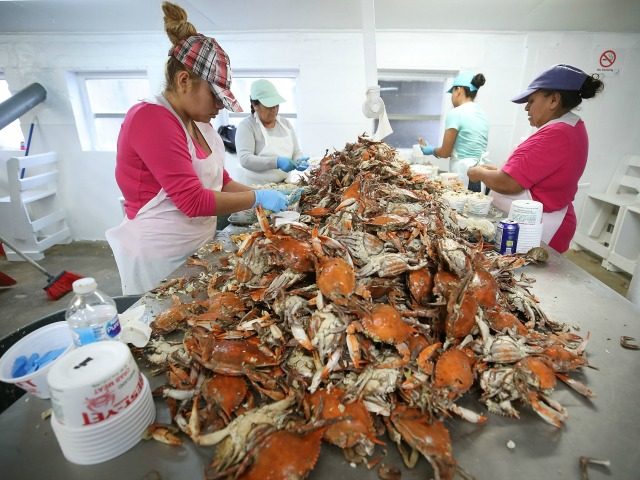Employers are raising wages for Americans in the crab-meat business because of President Donald Trump’s opposition to the H-2B blue-collar outsourcing program, the Washington Post admits.
The good news about supply-and-demand is hidden by the Post‘s reporter amid threats from business executives and laments from excluded Mexican workers. The 22nd paragraph of the article, which is headlined “‘Please come help’: Eastern Shore crab houses are suffering this summer because they didn’t get the visas needed to hire enough pickers from Mexico” says:
[Business-owner Aubrey] Vincent has upped starting wages — she pays $9.60 an hour, plus $4.50 for each pound of crabmeat picked — and partnered with a temp agency in nearby Cambridge, Md., to try to recruit local workers. Of 60 applicants, only a handful were hired and stayed on …
Eden Park, an Eastern Shore native who works the docks for Lindy’s, said he has been clocking hours six days a week this summer to help the business keep up with demand.
He used to work alongside eight H2-B workers. But this year, there are none with him on the docks. In addition to unloading bushels of crabs, or driving a truck in from town, he is also contacting customers, delivering crabs, grading them, loading trucks, making sure those trucks depart, and refueling and washing the vehicles when they come back in.
“My responsibilities got astronomically a lot larger,” he said.
The Post article plays up employer Harry Phillips, who complains that he was caught short when the landscaping and forestry industry snatched up the 66,000 H-2B visa-workers, leaving him with no visas to import the Mexican women he normally uses to pull crabmeat out of crabs:
All I got to do in Mexico is put up a building. I got people there to run the plant and also pick the crabs.
However, Mexican crabs cannot be sold to customers as Maryland crab.
The Post article also plays up complaints from excluded Mexican workers:
“It’s what I know how to do best, what I’ve learned to do the most,” [one] said. “It’s like it was a job I was destined to have all my life.”
The good news about crabbing wages may not survive into 2019, in part, because the GOP-run homeland defense appropriations bill includes bipartisan legislation expanding several visa-worker programs. Led by subcommittee chairman Rep. Kevin Yoder from Kansas, the committee agreed to triple the 66,000-per-year H-2B program to almost 200,000 visas a year by excluding prior-year workers from the annual cap. Breitbart News reported:
The new amendment will allow CEOs to hire H-2B workers from the two prior years without counting them under the 66,000 annual cap. That legal trick will give CEOs a population of up to 198,000 H-2B workers to help lower wages for a larger number of Americans — even though wages are climbing very slowly in the current good economy, and many younger Americans are far worse off than their parents.
The proposed H-2B population is huge — it is roughly equal to the number of new jobs added in a good month.
“The cheap-labor lobby never sleeps,” said Mark Krikorian, director of the Center for Immigration Studies. “The only solution is the elimination of the [H-2B] category.”
… The proposed H-2B expansion “really does show these numerically limited visas are unsustainable,” said Krikorian. He continued:
Whatever [numerical] cap lawmakers promise on a work-visa program is always going to go up … because as soon as some employer starts using it, the other employers need to use it to stay competitive… Once a significant number of players in an industry have this cheap, controllable foreign labor, everybody has to get it for [the program] to be fair — or the ones who don’t have it are going out of business.
Most of the blue-collar H-2B visas and workers are snapped up by the huge number of competing landscape, resort and forestry companies, regardless of their ability to offer higher wages to persuade local Americans to take the jobs.
The landscaping and resort companies strongly oppose any prioritization in the allocation of visas, which would likely deliver visas first to the popular seafood industry. Prioritization would require the landscaping companies to justify their own demands to hire foreign workers for jobs in urban districts.
Companies — including Trump’s own hotel and resort companies — want H-2B visas because the foreign workers are cheaper than hiring Americans away from other jobs. But the cheaper seasonal labor also means that employers can pay lower wages to supervisory workers and year-round workers.
Yet many companies also need H-2Bs to avoid a marketplace disadvantage because the government will give H-2Bs to rival companies. This dynamic forces companies to compete for the foreign workers instead of painfully changing their businesses practices to match the cost of hiring Americans for seasonal work. This process means that many companies that use H-2B become dependent on the program — and claim they will go out of business unless they keep getting H-2B workers.
In 2017 and 2018, companies persuaded Congress to expand the program by 15,000 workers each year.
However, Chile, China and other countries are combining cheap labor with automation to sell cheap fresh and frozen crabmeat to U.S. consumers. This growing threat of imports is pushing some high-cost fishing centers towards the difficult task of developing robots that can pick crab.
Some H-2B employers use the program to discriminate against Americans. According to a June 2018 statement by the Department of Justice:
The Justice Department today reached a settlement agreement with Triple H Services LLC, (Triple H), a landscaping company based in Newland, North Carolina, that conducts business in Virginia and four other states. The agreement resolves the Department’s investigation into whether Triple H discriminated against qualified and available U.S. workers based on their citizenship status by preferring to hire temporary workers with H-2B visas, in violation of the Immigration and Nationality Act (INA).
The Department’s investigation found that although Triple H went through the motions of advertising over 450 landscape laborer vacancies in five states, it did so in a manner that misled U.S. workers about the available positions and prevented or deterred some from applying. The Department found that Triple H did not consider several qualified U.S. workers who applied for positions in Virginia during the recruitment period, and instead hired H-2B visa workers. In several states where jobs were available, the Department found that Triple H prematurely closed the online job application process for U.S. worker applicants, filled positions with H-2B visa workers without first advertising the jobs to U.S. workers in the relevant locations, or advertised vacancies in a manner that did not make the postings visible to job seekers using state workforce agency online services.
More importantly, the effect of the H-2B program is to flood the market with foreign workers and so drop wages for a broad swath of Americans. That wage drop also deters lower-skilled Americans from seeking jobs in the H-2B-using industries and companies.
Many polls show the public opposes guest-workers as a threat to their salaries and jobs. An August 2017 poll reported that 68 percent of Americans oppose companies’ use of white-collar H-1B visas to outsource U.S.-based jobs that could be held by American graduates. More than 1 million foreign college-graduates now hold visa jobs in the United States.
Migration Economics
Four million Americans turn 18 each year and begin looking for good jobs in the free market — but the government provides green cards to roughly 1 million legal immigrants and temporary work-permits to roughly 3 million foreign workers.
The Washington-imposed economic policy of economic growth via mass-immigration shifts wealth from young people towards older people by flooding the market with foreign labor. That process spikes profits and Wall Street values by cutting salaries for manual and skilled labor offered by blue-collar and white-collar employees. The policy also drives up real estate prices, widens wealth-gaps, reduces high-tech investment, increases state and local tax burdens, hurts kids’ schools and college education, pushes Americans away from high-tech careers, and sidelines at least 5 million marginalized Americans and their families, including many who are now struggling with opioid addictions.

COMMENTS
Please let us know if you're having issues with commenting.